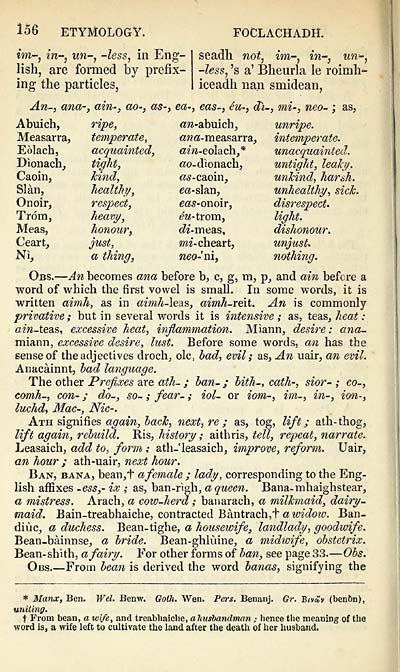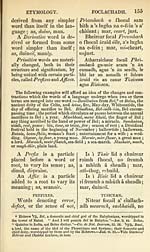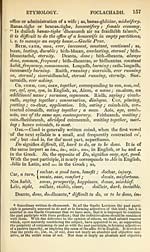Books and other items printed in Gaelic from 1841 to 1870 > Stéidhean a' Ghràmair Ghaëlig
(184) Page 156
Download files
Complete book:
Individual page:
Thumbnail gallery: Grid view | List view

Ì56 ETYMOLOGY.
FOCLACHADH.
im-, in-, un-, -less, in Eng- seadh not, im-, in-, un-,
Hsh, are formed by prefix- -less, 's a' Bheurla le roimh-
ing the particles, iceadh nan smidean,
An-, ana-, ain-, ao-, as- } ea-, eas-, èu-, d\-, mi-, neo- ; as,
Abuich,
ripe,
<m-abuich,
unripe.
Measarra,
temperate,
awa-measarra,
intemperate.
Ji.olacii,
acquainted,
d^-eolach,*
unacquainted.
Dìonach,
tight,
ao-dìonach,
untight, leaky.
Caoin,
Jcind,
«s-caoin,
unkind, harsh.
Slàn,
healthy,
e#-slan,
unhealthy, sich.
Onoir,
respect,
eas-onoir,
disrespect.
Trom,
heavy,
<?w-trom,
light.
Meas,
honour,
efo'-meas,
dishonour.
Ceart,
just,
mi- cb.ea.rt,
unjust.
Nì,
a thing,
neo-'ni,
nothing.
Obs. — An becomes ana before b, c, g, m, p, and ain befcre a
word of which the first vowel is small. In some words, it is
written aimti, as in aimh-\eas, aimh-reit. An is commonly
privative ; but in several words it is intensive ; as, teas, heat :
am-teas, excessive heat, inflammation. Mìann, desire : ana-
miann, excessive desire, lust. Before some words, an has the
senseof theadjectives droch, olc, òad, evil ; as, An uair, an evil.
Anacàinnt, had language.
The other Prefixes are aih- ; ban- ; bith-, cath-, sior- ; co-,
comh-, con- ; do-, so- ; fear- ; iol- or iom-, im-, in-, ion-,
luchd, Mac-, Nic-.
Ath signifies again, back, next, re ; as, tog, Uft; ath-thog,
lift again, rebuild. Ris, history ; aithris, tell, repeat, narrate.
Leasaich, add to, form ; ath-'leasaich, improve, reform. Uair,
an hour ; ath-uair, next hour.
Ban, bana, bean,t afemale ; lady, corresponding to the Eng-
lish affixes -ess,- ix ; as, ban-rìgh, a queen. Bana-mhaighstear,
a mistress. Arach, a cow-herd ; banarach, a milkmaid, dairy-
maid. Bain-treabhaiche, contracted Bàntrach,t awidow. Ban-
diùc, a duchess. Bean-tighe, a housewife, landlady, goodwife.
Bean-bàinnse, a bride. Bean-ghlùine, a midwife, obstetrix.
Bean-shìth, a fairy. For other forms of ban, see page 33. — Obs.
Obs. — From bean is derived the word banas, signifying the
* Manx, Ben. Wel. Benw. Goth. Wen. Pers. Benanj. Gr. BivòCv (benòn),
uniting.
f From bean, a wife, and treabhaiclie, ahusbandman ; hence the meaning of the
word is, a wife left to cultivate the land after the death of her husband.
FOCLACHADH.
im-, in-, un-, -less, in Eng- seadh not, im-, in-, un-,
Hsh, are formed by prefix- -less, 's a' Bheurla le roimh-
ing the particles, iceadh nan smidean,
An-, ana-, ain-, ao-, as- } ea-, eas-, èu-, d\-, mi-, neo- ; as,
Abuich,
ripe,
<m-abuich,
unripe.
Measarra,
temperate,
awa-measarra,
intemperate.
Ji.olacii,
acquainted,
d^-eolach,*
unacquainted.
Dìonach,
tight,
ao-dìonach,
untight, leaky.
Caoin,
Jcind,
«s-caoin,
unkind, harsh.
Slàn,
healthy,
e#-slan,
unhealthy, sich.
Onoir,
respect,
eas-onoir,
disrespect.
Trom,
heavy,
<?w-trom,
light.
Meas,
honour,
efo'-meas,
dishonour.
Ceart,
just,
mi- cb.ea.rt,
unjust.
Nì,
a thing,
neo-'ni,
nothing.
Obs. — An becomes ana before b, c, g, m, p, and ain befcre a
word of which the first vowel is small. In some words, it is
written aimti, as in aimh-\eas, aimh-reit. An is commonly
privative ; but in several words it is intensive ; as, teas, heat :
am-teas, excessive heat, inflammation. Mìann, desire : ana-
miann, excessive desire, lust. Before some words, an has the
senseof theadjectives droch, olc, òad, evil ; as, An uair, an evil.
Anacàinnt, had language.
The other Prefixes are aih- ; ban- ; bith-, cath-, sior- ; co-,
comh-, con- ; do-, so- ; fear- ; iol- or iom-, im-, in-, ion-,
luchd, Mac-, Nic-.
Ath signifies again, back, next, re ; as, tog, Uft; ath-thog,
lift again, rebuild. Ris, history ; aithris, tell, repeat, narrate.
Leasaich, add to, form ; ath-'leasaich, improve, reform. Uair,
an hour ; ath-uair, next hour.
Ban, bana, bean,t afemale ; lady, corresponding to the Eng-
lish affixes -ess,- ix ; as, ban-rìgh, a queen. Bana-mhaighstear,
a mistress. Arach, a cow-herd ; banarach, a milkmaid, dairy-
maid. Bain-treabhaiche, contracted Bàntrach,t awidow. Ban-
diùc, a duchess. Bean-tighe, a housewife, landlady, goodwife.
Bean-bàinnse, a bride. Bean-ghlùine, a midwife, obstetrix.
Bean-shìth, a fairy. For other forms of ban, see page 33. — Obs.
Obs. — From bean is derived the word banas, signifying the
* Manx, Ben. Wel. Benw. Goth. Wen. Pers. Benanj. Gr. BivòCv (benòn),
uniting.
f From bean, a wife, and treabhaiclie, ahusbandman ; hence the meaning of the
word is, a wife left to cultivate the land after the death of her husband.
Set display mode to:
![]() Universal Viewer |
Universal Viewer | ![]() Mirador |
Large image | Transcription
Mirador |
Large image | Transcription
Images and transcriptions on this page, including medium image downloads, may be used under the Creative Commons Attribution 4.0 International Licence unless otherwise stated. ![]()
| Rare items in Gaelic > Books and other items printed in Gaelic from 1841 to 1870 > Stéidhean a' Ghràmair Ghaëlig > (184) Page 156 |
|---|
| Permanent URL | https://digital.nls.uk/101713807 |
|---|
| Description | Out-of-copyright books printed in Gaelic between 1631 and 1900. Also some pamphlets and chapbooks. Includes poetry and songs, religious books such as catechisms and hymns, and different editions of the Bible and the Psalms. Also includes the second book ever published in Gaelic in 1631. |
|---|

